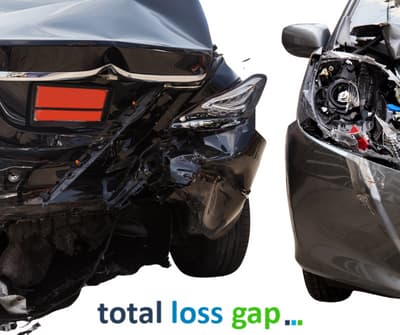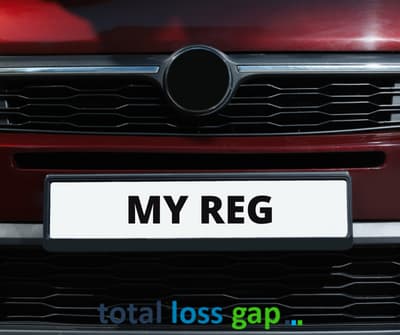Call Monday-Friday 9am - 6pm Closed Saturday & Sunday



[ Contact Us ]
Need Help? Calling from a mobile please call 0151 647 7556
0800 195 4926Do you have a question? or need help?
Call Monday-Friday 9am - 6pm Closed Saturday & Sunday,
Having a car written off is never a nice experience. It is the key reason why people look to take GAP Insurance out on their vehicle. So what would be the practical impact on you, as the vehicle owner, if your motor insurer declared your car a write-off?
Here we explain some of the issues that you may face.
Firstly, a few facts for you.
So, it is not as uncommon as you might think

Most people are familiar with the term insurance write off, but may be unclear about what insurers actually mean by it. Here we provide a simple explanation.
A car write off can occur when your vehicle:
- Is stolen and not recovered
- Is so badly damaged, following a fire, flood, accident or recovered theft that it can't be economically repaired
In simple terms, if your car is declared a write off, it means that the repairs cost more than the vehicle is actually worth.
If your car is so badly damaged that it would be uneconomical to repair it, your insurer may declare it a write off. This decision will usually be made following an assessment by their engineer or surveyor.
In declaring your car a total loss following the write off incident, your car insurance provider will normally compensate you by providing a settlement equivalent to the current market value of the vehicle. This is in lieu of repairing or replacing the vehicle for you.
The market replacement value of your car is what it would cost, at that time, to replace the vehicle with the same age, mileage and condition as your car was at the point of loss.
The market replacement value of a vehicle is based on a number of different factors, including make and model, age, mileage, and condition.
You can get an idea of the current car's market value by using an online car valuation tool, or by having a look at the current equivalent models on sale in the market.
Not normally no, but there are exceptions to this that we will explain below.
If you have a comprehensive car insurance policy in place, the insurer will usually offer you a cash settlement that is based on the current market value of your vehicle at the time it was written off.
So if your car, before the write off incident, was a 2 year old, 20,000 mile Ford Fiesta ST then the market value would be for a 2 year old, 20,000 mile Ford Fiesta ST.
So even if your car was brand new when you bought it, in most cases the market value will take into account the age, mileage and condition.
There are occasions where the settlement your motor insurer will provide will be for a new replacement car, not the market value. This is normally subject to a number of criteria being met, including:
Whilst it may be easy to expect that this new car replacement term will always work for you, there are a number of reasons it may not. The recent Covid 19 pandemic saw the number of new cars produced significantly reduced. Therefore if there is a requirement to source a replacement new car within a set time frame then this may not be possible.
The question is what will your insurance company do instead?
If the car is written off and you do not qualify for a new replacement then that could cause issues if you only get the current market value instead, and do not have a Gap Insurance policy in place.
Many cars are funded by some form of a car finance deal. If the car is a write off then many people do not consider what happens with the outstanding finance balance, or monthly payments, on the financed car.
It is important to be aware of the implications if you have car finance and this situation should ever arise.
If you have an outstanding hire purchase settlement on your vehicle, and it is subsequently written off, your finance company will be entitled to claim the outstanding balance from you. This is because, as the owner of the vehicle, you are still liable for the debt, even though the vehicle no longer exists.
If you are unable to pay the outstanding balance, the finance company may take legal action against you to recover the money owed.
It is therefore important to be aware of the implications of having a car written off if you have outstanding finance on it. If you are concerned about this, you should speak to your finance provider to discuss your options.
Of course, the insurance money you receive as a settlement from your comprehensive car insurance policy can go some way to helping. However, on its own, it may not be enough to cover the total outstanding finance settlement.
You may have the good fortune and foresight to have taken a Gap Insurance policy out on the car when you first bought it.
You may also like:
Return to Invoice Gap Insurance
Vehicle Replacement Gap Insurance
If your car has a private number plate on it, you will probably want to retain it to put on another car. It is possible to do this but you must be quick..........or risk losing your place with the car.
What are the steps that you must take to protect your personal number plate if your car is written off? Purchasing a private number plate for your car provides with the rights to use it. But that is all, you just have the rights, the plate remains with the car you put it on.
If your car is declared a write-off, you must submit an application to keep the registration number. Key points to ensure include:
The process of writing off your car is driven by your motor insurance company. As such, if they do write off your car they then own it, and in theory, the private plate on the car too. The cash payout for the car will not automatically see you get control of the private plate again. 
You should enquire as early as possible, with your car insurer,
Use a DVLA V317 form to apply, and put the registration number on retention.
Speed is the key to making sure you keep your plate. Speak to your insurance company early, and let them know what you want to do, or you risk losing your private plate.
It is too late once the car is sold on or scrapped. Once this happens the DVLA rules are clear….the plate has gone with the car.
If you have fully comprehensive motor insurance in place, and your motor insurer writes off the car, you would normally expect to get the current market value for the same age, mileage, and condition of the car in settlement to replace it.
If you have an excess on your motor insurance then this is normally deducted from your settlement.
Yes, you can normally buy the car back once the insurance company has ruled it a total loss. If you receive a settlement, your insurer will return your vehicle to you rather than selling it to a 3rd party salvage company.
Whatever the salvage value of the car is will be deducted from your write-off settlement from your car insurance provider.
If it is a lease car written off then you would have to speak to the leasing company to see if they would allow this also.
Buying insurance write off cars is not something you should do without full consideration of what you are doing. Repairs could be costly and do you really want to drive a vehicle that has been that heavily impacted?
A Non fault car insurance claim normally involves claiming off the third party who caused your car to be written off. Your motor insurer may do this on your behalf, or a claims management company could be appointed for you instead.
Any excess on your motor insurance should also be covered by the insurer of the third party at fault.
There are a few options available but much will depend on the extent of the damage to the vehicle. When a car is written off there are four write off categories that can be assigned, depending on the damage.
Minor damage will often see a car professionally repaired and put back on the road. They are known as category S and N write offs (formally C and D before October 2017). All S and N write offs must be notified to the DVLA by a V23 submitted form. It is against the law for a motor trader to sell a written off car without declaring it to the buyer.
If the vehicle has suffered significant damage (called a category A or B write-off) then these vehicles are deemed unsafe and cannot be put back on public roads. These vehicles may have suffered structural damage to the entire vehicle bdoy shell, for example
.jpg)
It may come as a bit of a surprise to you, but if your car is written off you will have to continue to pay for your motor insurance until the end of the term.
The same is true if you have Gap Insurance and you claim to make up for any shortfall from your motor insurance payout for the pre-addicent value, back to the original price you paid.
So if you are paying for your insurance monthly, and the car is written off, do not cancel your direct debit payments or you could run into some issues with your claim.
The decision to write off your car or not is down to your car insurance company. Ultimately the car is insured by them and if the repair costs are uneconomic then the motor insurer will provide you with a settlement figure in compensation, so you can replace the car. Securing the vehicle replacement is down to you.
As such, your motor insurance company may be happy to discuss your claim, ultimately it is their decision as to whether the car will be written off or not.
If you've been in an accident and your car is written off, you might be wondering if you can negotiate with the insurance company. The answer is yes if you think the offer they make to you is too low.
The motor insurer should provide you with the market value, at least, in the settlement. This means the amount that you would need to replace the car with the same age, mileage and condition that your insured car was when it was written off. This also means how much you would have to pay if you bought the car from a reputable car dealer, not an auction or privately.
You can check the current market value of your car by looking at the likes of Glass Guide or CAP. You can also check online marketplaces like Autotrader to find examples for sale now.
If you think the offer from your insurance company is too low then gather the evidence to show them why you think the offer is too low. If they still refuse to raise their offer, and you still disagree with them, then you can go through their complaints procedure and on the Financial Ombudsman in many cases.
So there you have it, a guide to what happens when your vehicle is written off by your insurance provider. If you have any questions or would like to add anything to this guide, please get in touch.
This article is for general informational purposes only and does not constitute advice on your particular insurance. Please check with your vehicle insurance provider for specific details on your cover.